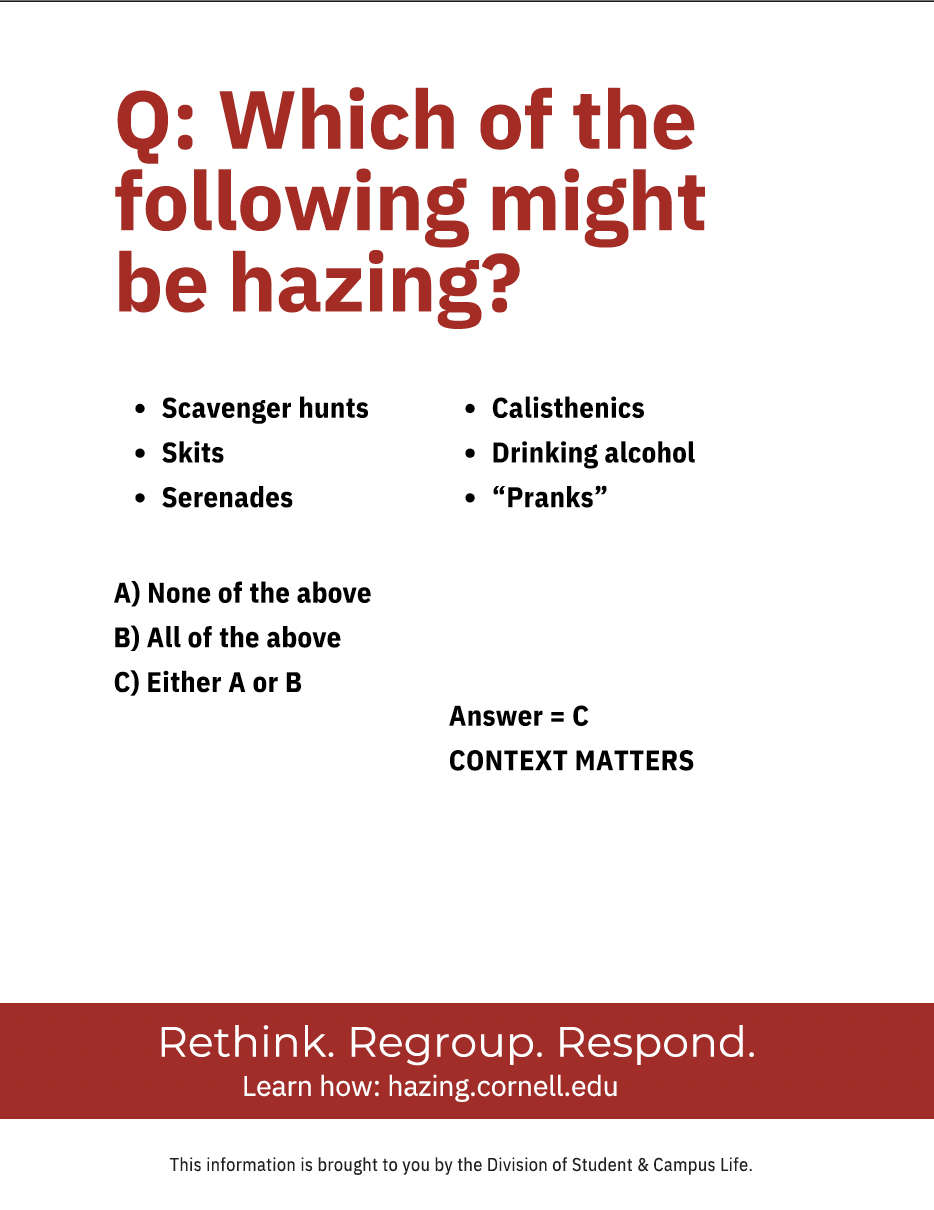Hazing 101
About Hazing
Hazing is a harmful form of interpersonal violence that often negatively impacts physical and/or mental health, often involves sexual abuse, and very often involves alcohol. This serious public health issue poses risks to the physical safety and psychological well-being of individuals here at Cornell and at other colleges and universities nationwide.
Most often, people are hazed when joining various groups, teams, and organizations. However, hazing can also occur as part of continued membership. The impact of hazing on individuals and the community can be severe, long-lasting, and even fatal.
Cornell takes a comprehensive, public health approach to hazing and recognizes that everyone has a role to play in creating a health promoting campus culture that does not tolerate hazing.
Not Just an Innocent Rite of Passage
Joining student groups, teams, and organizations can be a great way for students to connect to others with similar interests, values, and goals. Unfortunately, a small number of groups take advantage of students’ desire to increase their sense of belonging, connection, and friendship, by conducting activities that meet the campus definition of hazing.
Details of hazing violations and corresponding sanctions across campus groups, teams, and organizations are listed on the Cornell University Hazing website, see Violations. Hazing is not an innocent rite of passage, nor is it necessary to perpetuate “legacy” behaviors or “traditions” that may have been done in the past.
Context Matters
Over time, the dangers of hazing have become better understood and our awareness of its impact has fundamentally changed. Activities you may never have thought to question – fit the Cornell University definition of hazing and can be referred to the Office of Student Conduct and Community Standards for review and sanctioning. Additionally, some group activities can be considered hazing depending on the context in which they occur.
For example, intimidating new members through humiliating and degrading practices was once seen as an acceptable way to foster bonds among team members. Over time, however, our attitudes have changed. The good news is that 93% of Cornell students believe it’s never okay to humiliate or intimidate new members of a group, team, or organization.
It’s always important to consider multiple perspectives when designing activities for new members of any group, team, or organization. It is up to you to make sure your organization does not engage in hazing or other unacceptable activities throughout the year. If your group is unsure whether your proposed activity violates Cornell University’s Hazing Policy, there are resources available to help you.
Special Considerations for Student Leaders
Leaders of student organizations are responsible for ensuring that the planned activities for new and existing members do not violate the University policy against hazing and do not violate New York State law. Even simple pranks and jokes can rise to the category of hazing if not considered carefully.
Ethical & Values-Based Leadership
If you have taken on a leadership role within your student group, team, or organization, you have a responsibility and opportunity to lead your organization well. This includes creating a welcoming and inclusive culture to onboard new members to the organization. The platform you have as a leader is a privilege. It empowers you to be active participants in creating a health promoting culturing shift for your group, team, or organization.
Take some time to reflect and think about the people in your own life you admire and find to be effective leaders.
- What are the key attributes and qualities that those leaders embody that contribute to their effectiveness?
- Are they kind and compassionate leaders?
- Do they make sound ethical decisions?
- Are they transparent and authentic leaders?
- Do they lead with the values of the organization?
- Do they make safe and compassionate choices for the organization and its members?
- Have they developed welcoming, inclusive, and safe environments?
- Do they seek out feedback and are receptive to it?
- Do they hold themselves and others accountable when necessary?
- Are they willing to be held accountable by others for their own actions?
- Do they support and make the people around them better?
- View or print our current "Which of the following might be hazing?" poster (CU NetID required)
- Review other hazing campaign materials from Cornell Health (CU NetID required)

